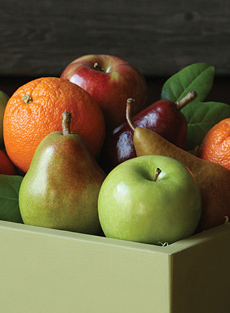EARTH DAY: 10 Reasons To Eat More Organic Food
 Fresh fruit is even better for you when you’re not consuming pesticides (photo © The Fruit Company). |
“Organic” doesn’t simply mean that the food is chemical-free; it’s also produced in ways that are good for the planet.
The USDA’s National Organic Program certifies products as organic based on farming, handling, manufacturing, distribution and labeling practices. April 22nd is Earth Day. According to EarthDay.org, more than one billion people in 192 countries are taking some action to save our planet. Eating organic food is one of them. |
|
|
HERE ARE 10 REASONS TO EAT MORE ORGANIC PRODUCTS—TODAY & EVERY DAY 1. Nutrition without chemical pesticides and fertilizers. While no studies have yet proven that organically-grown produce has more vitamins and minerals, we know one thing they don’t have: chemicals. 2. No GMOs. Organic products are governed by the USDA’s National Organic Program. When you buy organic, you’re guaranteed that no genetically modified organisms are in your food. Here’s the scoop about GMOs in food. |
||
|
3. No antibiotics. Humans consume unwanted antibiotics in conventional meats. 5. No irradiation. Irradiation is used to color foods synthetically. Here’s more about food irradiation. 6. Government inspected. Organic farms and production facilities must be inspected by the USDA at least once a year. |
 Organic milk is free of antibiotics and hormones. Photo by Rob Waterhouse | SXC. |
|
|
7. Environmentally friendly. There are no chemical pesticides to not sink into the water table (from which we all drink); the land is farmed sustainably to prevent erosion and other degradation of the soil. 8. Good for animals. Animal welfare is a key component of organic meat production. Here‘s the scoop on organic meat. 9. Good for the climate. Organic production watches its carbon footprint and emits less carbon dioxide, a greenhouse gas that erodes the ozone layer. 10. Better taste. While there are no scientific studies on flavor, most fans agree that the pure taste of nature simply tastes better. Maybe it’s the halo factor of knowing that the food has been produced in ways that are better for us and our planet. |
||